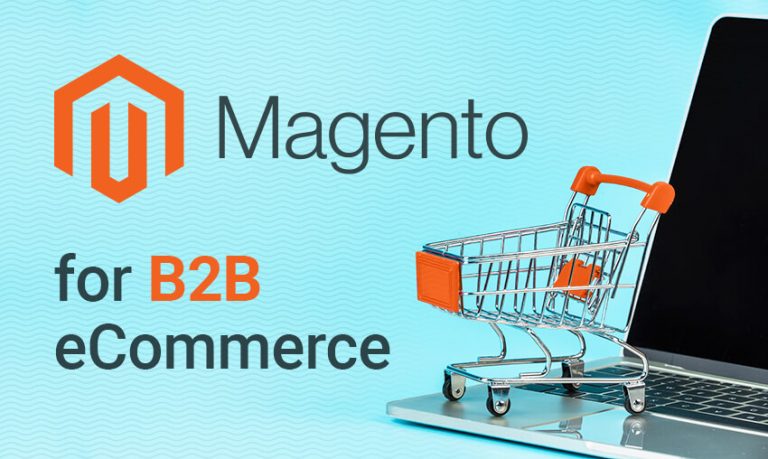It’s easy to look at B2C and B2B ecommerce as one amorphous entity. After all, both B2B and B2C businesses sell their products online. Can it be all that different? A big Yes! B2C and B2B ecommerce are worlds apart.
The Core Differences between B2C and B2B Ecommerce
To sum up the differences in a nutshell – B2C ecommerce is about satisfying the emotional needs of the customers, whereas B2B ecommerce decisions are fuelled by logic.
B2B purchases are need-based, driven by logic and facts, and impact the bottom line of the business. Simply put, B2B choices aren’t made on a whim and are mostly pre-planned.
The UI and UX are not the only design criteria to consider while designing a B2B ecommerce store. Other factors like helping buyers find relevant information, and locate the products they are looking for – are some of the other criteria you have to consider.
You need an ecommerce platform that meets the specific needs of B2B businesses. This is where Magento 2 comes into the picture.
Magento – A Perennial Favorite among Ecommerce Sellers
For a long, Magento has been a favorite of ecommerce sellers – big and small. The open-source, PHP-based ecommerce platform accounts for over 12% of all ecommerce stores globally. It’s one of the most popular CMS (Content Management Systems) and powers over 250,000 active sites, i.e., roughly 1.2% of the internet.
Adobe took over the ownership of Magento in mid-2018, and the resources of the parent company are sure to leverage the platform’s strengths and make it bigger. While traditionally, Magento has been used by B2C ecommerce sellers, the new expansion Magento 2 comes power-packed with an array of features and benefits, tailored explicitly for B2B businesses.

See How Our Experts Can Drive More Traffic to Your Website!
SEO: Boost your rankings and drive more organic traffic today!
Website Design/Development: Create a stunning website that converts visitors into customers.
Paid Media: Reach the right audience at the right time with expertly managed paid media.
Here, in this article, we take a look at the top factors why Magento is the right choice for B2B ecommerce.
1. User-friendly
If this is your first time building an ecommerce store, you would certainly appreciate the user-friendliness of the platform. It comes with several features that make your website appealing and intuitive. Magento can be easily integrated with ERP and CMS, thereby making product procurement easy and seamless. It also offers hassle-free checkouts, which are a massive plus for B2B customers.
2. Support for Bulk Ordering
Unlike B2C, most B2B customers purchase in bulk. A B2B ecommerce website must provide a seamless bulk ordering process. With Magento, customers can search for products available in the store easily using advanced filters or by entering product SKUs (Stock Keeping Units). Additionally, it also allows customers to copy a previous order or use requisition lists for faster checkouts.
3. Real-time Access to Business Financials
Magento helps in keeping you updated with real-time information about your trading account – like available credit limit, inventory balance, stock requirements, etc. With this information at hand, you can make informed business decisions based on your assets and liabilities, thereby helping you stay on track with your financials.
4. Efficiently Segment Customers
One of the significant differences between B2B and B2C is that in B2C – each customer is different. By availing of Magento 2 development services from a trusted developer, you can easily segment customers into various groups based on different criteria like – ordering quantities, credit limit, frequency of order, order history, etc.
It helps you provide a customized experience for each buyer. Additionally, you can also keep track of the buying behavior using their purchase history, thereby providing them with tailored offers and discounts, thus boosting sales.
5. An Array of Powerful Reports
Not many Magento users are aware of this feature. The Magento platform comes equipped with nearly 75 in-built reports that give you a clear idea of the performance of your organization in all areas. Purchasing reports, sales orders, product information reports, and procurement reports – all help in streamlining your business processes.
6. Get In-depth Sales Insights
Getting ecommerce development services to build your B2B online store using Magento gives you a clear – micro and macro – insight into your sales. You can easily track individual purchases as well as generate sales reports for the week, month, or quarter. Using these insights, you can streamline your inventory, avoiding the over-building of your inventory.
Having a clear picture of your sales helps you maintain a proper workflow and cash flow in your business, thereby avoiding bad debts or poor inventory decisions.
7. Generate Customized Quotes for Each Customer
A B2B sale doesn’t happen in a single step. It’s not like a customer arrives at your site, adds products to their shopping cart, and checks out. B2B sales involve plenty of negotiations and back-and-forth between the buyer and the seller. The quotation plays a crucial role in making or breaking the deal.
Magento offers an efficient quotation generation module, which makes it easy to build customized quotations based on customer requirements, thereby boosting your chances of closing the sale. Magento understands that negotiations are part of the sales process for B2B sellers, which is why it offers a streamlined process for quote generations and price negotiations.
8. In-built Customer Service Modules for Increasing Sales
Magento offers various value-added customer services like up-selling, cross-selling, customized selling, etc. to help B2B business owners increase their sales volumes. You can use the in-built customer service modules to keep track of customers and convert them into regular buyers.
9. Create Custom Catalogs
When you hire a certified Magento developer, you can get them to help you customize catalogs and product price lists based on customer segments. To give an example, you may provide additional discounts for regular customers compared to one-time buyers. Magento makes it easy to offer customized prices, thereby increasing your returns on each sale.
10. Smart Inventory Management
As a B2B seller, you are likely to have a long and complicated supply chain. Magento simplifies and improves the efficiency of inventory management thanks to automated business rules for order fulfillment. For example, you can set automatic ordering for specific items that you sell. When the stock quantity of these items falls below a certain level, the system sends an email to the supplier requesting a fresh order. It not only helps you save time but also ensures that you maintain the right stocks of all products at all times.
Simply put, Magento improves your daily operations and streamlines inventory management.
List of Dedicated Features offered by Magento for B2B Sellers
Here, we give you a list of the dedicated B2B features that you can get with Magento.
- List of verified contractors.
- List of consultants who can accept orders from the customers by email/phone/in-person meetings.
- Buyers can save shopping cart content for future orders and share shopping cart content with other team members to make group decisions.
- Additional payment methods tailored to B2B requirements like trader credit, 30-day payment time, etc.
- Wholesale ordering support for customers.
- Price negotiations and customized quotes.
Besides these features, Magento offers other critical functions like:
- Device independency – customers can browse and shop from any device
- Speedier purchases – customers can quickly locate required products
- All marketing at one place – Keep track of all your marketing efforts right from Magento
- Integration with third-party tools to extend the functionality of the platform
- Integration with ERP and CRM to manage all aspects of your business seamlessly
Magento B2B eCommerce – The Right Choice for B2B Sellers
With Magento, you can provide your customers with an efficient, seamless buying experience, irrespective of whether you sell to B2B, B2C, or both. If this is the first time you are building an online store for your B2B business, then you can directly get started with Magento to enjoy its array of features and functionalities. On the other hand, if you already have an ecommerce store, you can consider Magento 2 migration to enjoy the features of this robust and versatile platform.
Get better control over your ecommerce B2B store and deliver a fantastic shopping experience to customers all across the globe.






